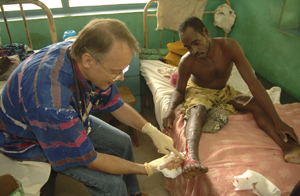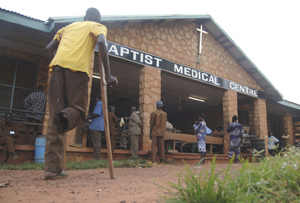All eyes focus on missionary surgeon Danny Crawley as he navigates an obstacle course of beds and sick children at the Baptist Medical Center in Nalerigu, Ghana.
 Missionary surgeon Danny Crawley, originally from South Carolina, makes morning rounds visiting patients at the Baptist Medical Center in Nalerigu, Ghana.
Missionary surgeon Danny Crawley, originally from South Carolina, makes morning rounds visiting patients at the Baptist Medical Center in Nalerigu, Ghana.With only one other doctor, a handful of assistants and volunteers working that day, a “doctor sighting” is a significant moment to those desperate for medical attention. While making his rounds, Crawley tends to as many patients as possible before prepping for surgery. The others will have to wait.
Understaffed and overwhelmed by the daily influx of patients, the hospital struggles to fill an empty position and attract volunteers while meeting the physical and spiritual needs of patients. In 2005, the hospital saw more than 72,000 patients and performed more than 3,500 major and minor surgeries. The staff hopes more Southern Baptists will respond to these needs soon.
“Even if I stop and pray with a patient, I feel like I’m slowing down the process,” said Crawley, who sets aside one day a week with his wife Mary Jane to share Bible stories in area villages. “But if we’re not letting them know that we’re helping them in the name of Christ, what is the point of it?”
Without four doctors on staff, the hospital is unable to maintain a consistent ministry presence among the villages in the area. It hasn’t always been this way for the hospital that each year attracts thousands of people from four different countries.
Promise cut short
Nearly three years ago, everything seemed to be falling into place for the hospital staff.
A promising 47-year-old doctor, Janette Shackles, had come on board to reduce the demanding workload of the hospital’s three doctors. The addition boosted the morale of a worn-out staff.
 The medical staff of Baptist Medical Center in Nalerigu, Ghana, saw more than 72,000 patients and performed more than 3,500 surgeries in 2005.
The medical staff of Baptist Medical Center in Nalerigu, Ghana, saw more than 72,000 patients and performed more than 3,500 surgeries in 2005.“She had a wonderful ministry, and she related so well to the patients,” says former hospital administrator Patricia Friesen. “Our doctors were making the work schedules more manageable. They were even having time to do outside evangelistic ministries, which they each have a desire to do.”
But tragedy changed all of that when Shackles died in a traffic accident June 9, 2003. She was on her way back to the hospital with medical supplies when an oncoming vehicle hit her truck.
“It was devastating,” Friesen remembers. “It was just a difficult time. It really was, besides the personal loss of losing a colleague, but also the impact of how we had finally gotten more positions.”
Today, with the three remaining doctors, some on staff wonder if the gap left by Shackles will ever be filled. The long hours and daily stress continue to take their toll on all involved.
Long hours and hard work
“It’s always been hard, with long hours and hard work,” says George Faile, who has been a physician at the hospital for 17 years. “But this is the first time in a couple of years that I’ve wondered if maybe God had something else for me.”
Strong words from a man whose father, George Faile, started the hospital nearly 50 years ago. Since then, the elder Faile has passed away. A monument on the facility’s front lawn honors his work. Faile refers to his father as a “big inspiration” in his life. He said he still desires to finish the work to which God has called him.
“I feel like I have a lot invested here,” he says.
Hospital administration recognizes that the doctors need more time off and more time for ministry opportunities in area villages. Providing quality care, however, brings huge responsibility. Turning a patient away isn’t an option.
“Do we tell them, ‘You came too far, go back to where you came from’?” asks Friesen, hospital administrator for the past five years. “Where will they go?”
Malaria, snake bites, AIDS and more
On a typical clinic day at the hospital, hundreds of people make their way onto the property. In the crowd, people are afflicted with malaria, snake bites, various skin diseases, heart problems, AIDS and just about everything else. Some lie on the ground, some sit slumped on benches, while others stand for hours. None of them will be sent away before someone on the medical staff sees them.
 A mass of people wait for medical treatment at the Baptist Medical Center in Nalerigu, Ghana. Three IMB missionary doctors serve at the facility. Medical missionaries hope Southern Baptists will respond soon to the need for more personnel at the hospital.
A mass of people wait for medical treatment at the Baptist Medical Center in Nalerigu, Ghana. Three IMB missionary doctors serve at the facility. Medical missionaries hope Southern Baptists will respond soon to the need for more personnel at the hospital.Volunteers such as Doug and Alice Parkin, from Casa Grande, Ariz., help make this possible. The Parkins often take a couple of months off a year from their own medical work to assist the hospital through malaria season.
“The physicians are just so exhausted,” says Parkin, a doctor at a group practice and member of Grace Baptist Church in Casa Grande.
“When you come as a volunteer, the doctors are able to deal with more serious problems, and you can help with the more mundane things like malaria, tuberculosis and diarrhea.”
‘A light in a pretty desperate part of the world’
“This hospital is a light in a pretty desperate part of the world,” he adds.
But bringing in full-time doctors and volunteers isn’t a quick fix, either.
Completing the missionary appointment process, language and hospital training could take candidates at least two years. And most volunteers are limited in what they can do with their minimal language and field experience. However, the staff will take as many volunteers as they can find.
“I almost cried when I found out a fifth-year surgical resident was coming,” says Crawley, who has worked at the hospital nearly 10 years. “She was an answer to prayer.”
Without more volunteers and another full-time doctor, Crawley fears the hospital will be unable to sustain its care many more years.
“Opportunities are coming to us,” he says. “We just need to be able to follow up with them.”

The IMB’s missions team in West Africa needs you ? your prayers, your commitment, your resources, your church – to help. The IMB set aside all of 2006 to focus on reaching West Africa with the gospel. That is the focus of this year’s Week of Prayer for International Missions.
For resources and information on praying for the people of West Africa, serving there as a missionary or volunteer, or strategically involving your church, visit GoWestAfrica.org.